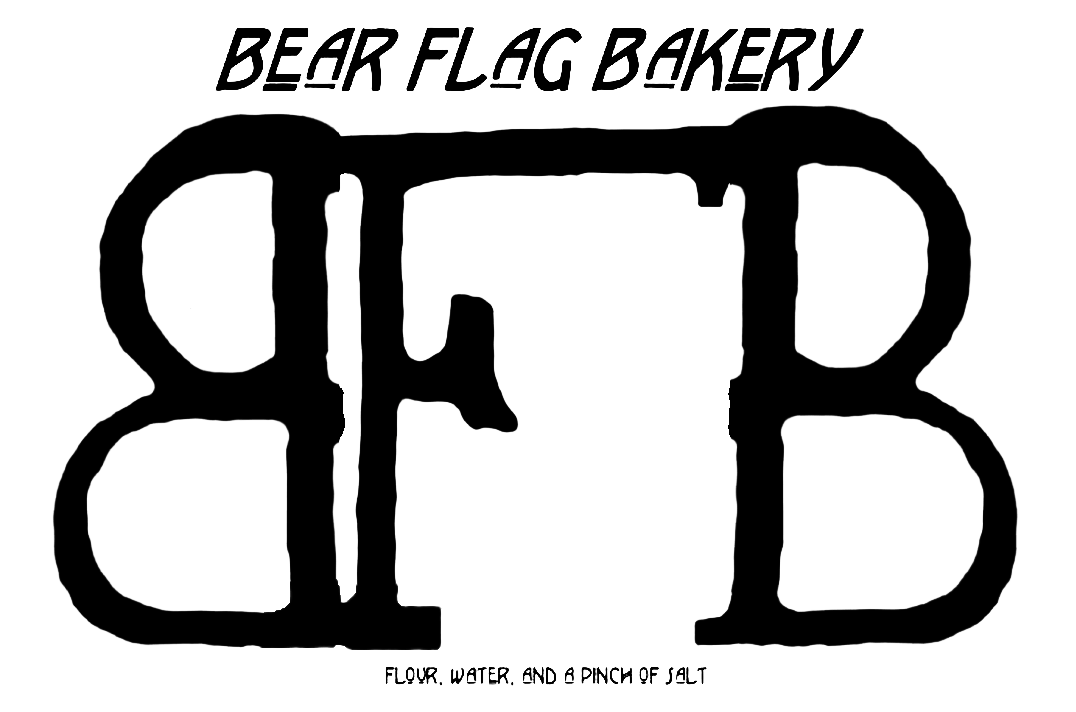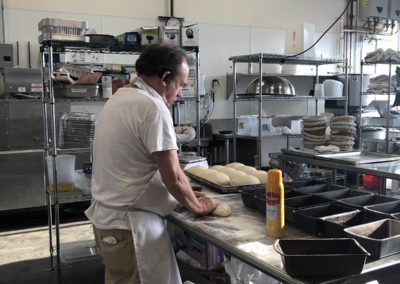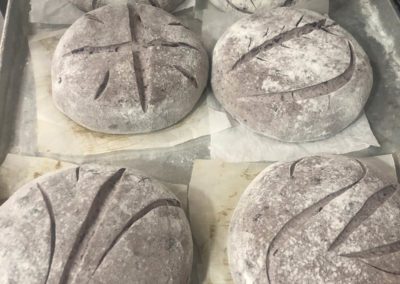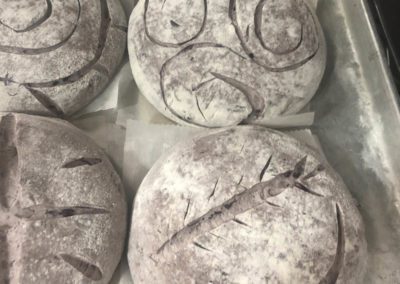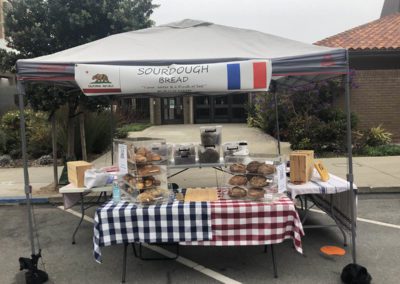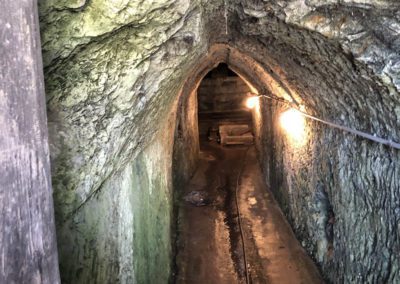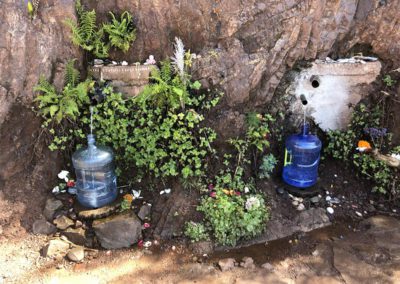Find Bear Flag Bakery
St. Ignatius Farmers Market
2001 37th Ave, San Francisco, CA 94122
Find us at the farmers market!
St. Ignatius Farmers Market
St. Ignatius College Preparatory
2001 37th Ave, San Francisco, CA 94122
Sundays
9am – 3pm
Order online for Sunday pickup at the market or local home delivery!
Contact the Kitchen
Questions? Contact us!
For bakery inquiries or to place an order, you may call/text Greg Harmon at 415-595-1101 or email at gharm2228@gmail.com.
The Bear Flag Kitchen is located at:
1661 Tennessee St, 2K
San Francisco, CA 94107
Send a Message
Bear Flag Bakery Water Story
As many of you know, I’ve been working hard to get regular access to the Albion Castle artesian water, as it really does make awesome bread. I’m having mixed success, but I should have more in a couple of weeks. As a short-term substitute, I began ordering spring water from Mayacamas Spring Water Co. up in Marin/Sonoma, whose water is from Cobb Mountain up by Cloverdale. Nowhere near as good as Albion, but way better than Hetch Hetchy water.
In speaking with a fellow baker, Matthew Jones of Avast Bakery mentioned that the high-end bakeries in Paris and France generally use spring water. That got me thinking that I should look beyond Albion to other artesian wells and springs. So, I began a search for other sources.
I continued talking to people about both Albion Castle and my intention to find other options. A Sunday market customer down from Nevada City told me she gets water from Bitney Springs as well as spring water from the ranch of a family friend up in the Sierra. She offered to bring some Bitney Springs water, and dang if she didn’t bring me four gallons of Bitney Springs water the next week!
In the meantime, my nephew who owns Argot Vineyards up in Sonoma called and asked me to bring up a cake from Schubert Bakery for his wife’s birthday. I mentioned to him my need for artesian water and he told me Argot and the adjacent winery (Belden Barns) had dug wells a few years ago and I was welcome to help myself.
I dropped off the cake and picked up thirty-five gallons! So now we’re testing that water in our bread. With more reports coming in of local springs, it seems I will have no trouble finding the best spring water for the flours I use.
All this folderol about water is just the latest step in my bread quest that began about nine or ten years ago.
I had gotten into bread baking back in college, but did not bake often or much. More recently I began to wonder about heirloom wheats and if it were possible to find any that would produce sourdough as good as the legendary old San Francisco sourdough was reputed to be.
Turns out, there were indeed such heirloom wheats being grown, specifically Sonora (the original Spanish hybrid from the 16th century) and Blanco Grande from the 19th century, among others. When I started baking, I got my Sonora flour from Pie Ranch down in San Mateo, and my Blanco Grande from Coke Farm in San Juan Bautista. I eventually found and still use David Kaisel’s Capay Mills flours along with Central Milling organic flours from Petaluma.
Still, dozens and dozens of brick-like loaves and rounds stood between me and edible bread, and several years went by before it was officially “good.” It was Craig Ponsford up in San Rafael who invited me to bake with him one night and suggested I go to San Francisco Baking Institute for classes, which I did. Chefs Stephane and Michel are fabulous teachers and bakers.
I eventually discovered that scientific consensus was that it was not the yeast or flours that made San Francisco sourdough so famous, but the Gold Rush and local well water. Sadly for bread bakers, the Gold Rush was now long over and Hetch Hetchy Dam water had replaced that of local wells and springs, circa 1915. With well water from San Francisco aquifers no longer available, it seemed likely impossible to even begin to recreate the truly original San Francisco sourdough, nor even test the idea that “it is the water.”
I shifted my mission to simply improving my craft, with the aim of baking the best sourdough possible for me to make. And that continues to this day. I resolved, however, to keep alert to the opportunity of using San Francisco spring/well water. You never knew!
In 2019 and 2020, doing gig work as an insurance inspector, I inspected a building on Innes Street in Bayview, right along the bay shore. You couldn’t really see the building from the street, as the front entrance was a wall of stacked 3-foot-thick granite slabs topped with overgrown shrubbery and an iron gate in the middle. The building was set back about 30 feet and decked back into the hillside. An open area in front of what served as the ground floor and had evidently been the location for a brewing cauldron.
The owner told me that the building was constructed in 1870 as a brewery and served as such until Prohibition. I wondered why a brewery would need three-foot thick granite walls. As we toured the upper reaches, I could see from the top floor and roof a clear view into the bay and the East Bay hills beyond. Easy aim for a cannon to shoot at a ship!
The construction clearly indicated that the designer of the property had a military background, if not military intentions for the property. After all, it would have been designed around 1868, just after the Civil War, with emotions still running high and worry about a secessionist action in San Francisco or elsewhere in California.
Nineteenth century U.S. Army military posts were required to have an on-site water source so trapped soldiers and horses could survive until help arrived. (This is why the armory in the Mission is actually built over old Mission Creek, which still runs under the building.) Imagine my surprise when the owner of the former brewery asked, “Would you like to see the cisterns?”
Would I?!
He took me into the ground level garage, past a door and into a tunnel into the hillside. There at the end of the walkway was a single light bulb over a cement wall, behind which was the glimmering glacier blue surface of pure San Francisco aquifer drinking water – 500,000 gallons of it that ran off 10,000 gallons a day into the Bay.
Well, pinch me ‘til I faint! Now I was convinced that the building had indeed been constructed as a military redoubt for trapped soldiers and the brewery business likely a cover story for a “sleeper fort” to be activated on a moment’s notice.
I told the owner I was a baker and would love to use some of the water to bake sourdough.
“Talk to my daughter,” he said, “work it out with her.”
Yahoo! I get to test the San Francisco water story!
I called the daughter, and got a “Yes, but call back in a couple of weeks.” After more than a year’s worth of my calling, texting, emailing, dropping off bread, leaving voicemails, finally, on July 3 at 1:15 p.m., I got a text: “You can have some water if you can be here by 1:30.”
I dropped everything and ran to the car. En route, a second text arrived: “Sorry, we have to leave, maybe next week.” I almost cried.
Then an hour later another text: “Why don’t you just arrange this with the groundskeeper, here’s his number….”
Why, indeed?!
I picked up water the following week.
Now was the test! Would the water make any difference? I sincerely doubted it but I had to know.
We set up a set of a dozen or so rounds and baked them at my commissary kitchen, Schilling & Co., run by the redoubtable Chef Alfred. And we waited.
As the bread rounds came out of the oven, I had to admit, they looked beautiful! And, they smelled great, too.
But did they taste any different or better?
The crust was as light and crisp as a winter morning. We sliced away and tasted. Wow. Best sourdough I’d ever tasted.
We baked more. Same thing. Awesome bread. We brought some to the Outer Sunset Farmer’s Market for others to taste. One customer took a sample, closed his eyes and, after a few moments’ silence, said “I’m back at my grandmother’s house in 1952, this is the bread I ate.” Dang!
Now, I won’t always have access to the “Albion Castle” San Francisco Yosemite Creek water, but I will be able to get spring water from artesian wells from all over northern California.
So, from this point forward every bread I bake will be made with pure, local NorCal spring water. Sometimes San Francisco, sometimes not. But always with spring water.
More bread, more adventure. Nice.
